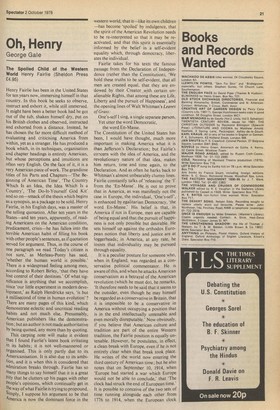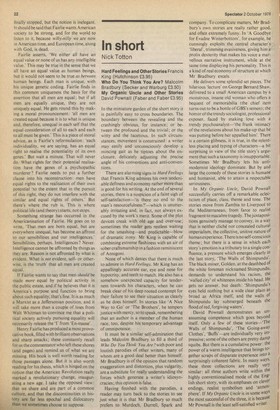Oh, Henry
George Gale
The Spoiled Child of the Western World Henry Fairlie (Sheldon Press 24.95) Henry Fairlie has been in the United States for ten years now, immersing himself in that country. In this book he seeks to observe, instruct and exhort it, while still immersed. It might have been a better book had he got out of the tub, shaken himself dry, put on his British clothes and observed, instructed and exhorted from a distance. Instead, he has chosen the far more difficult method of evaluating and criticising America from within, yet as a stranger. He has produced a book which, in its techniques, organisation and chapter headings is entirely American, but whose perceptions and intuitions are often very English. On the face of it, it is a very American piece of work. The grandiose titles of his Parts and Chapters—'The Beginning of American Time', 'The Country Which Is an Idea, the Idea Which Is a Country', 'The Do-It-Yourself God Kit' and so on—smack of the thesis which begins as a synopsis, as a package to be sold. Henry Fairlie, in his English days, was a master of the telling quotation. After ten years in the States—and ten years, apparently, of reading Americans on the American condition, Predicament, crisis—he has fallen into the terrible American habit of filling his book With other people's sentences, as if quotation served for argument. Thus, in the course of one paragraph we read 'Today's citizen is not sure,' as Merleau-Ponty has said, 'whether the human world is possible.' There is a widespread feeling among men, according to Robert Birley, 'that they have lost control of their destinies.' Of what sigMficance is anything that we accomplish, since 'our little experiment in modern development,' as Ralph Hendricke says, 'is but a millisecond of time in human evolution' ? There are many pages of this kind, which demonstrate eclectic and uncritical reading habits and not much else. Presumably, American publishers like the demonstration; but an author is not made authoritative by being quoted, any more than by quoting.
This carping note will make it evident that I found Fairlie's latest book irritating in its habits; it is not well-mannered or organised. This is only partly due to its Americanisation. It is also due to its ambition, and it is when this is considered that admiration breaks through. Fairlie has so Many things to say himself that it is a great Pity that he clutters up his pages with other People's opinions, which continually get in the way of what Fairlie is trying to propound. Simply, I suppose his argument to be that America is now the dominant force in the western world, that it—like its own children —has become 'spoiled' by indulgence, that the spirit of the American Revolution needs to be re-interpreted so that it may be reactivated, and that this spirit is essentially informed by the belief in a self-evident equality which, through democracy, liberates the individual.
Fairlie takes for his texts the famous passage from the Declaration of Independence (rather than the Constitution), 'We hold these truths to be self-evident, that all men are created equal, that they are endowed by their Creator with certain unalienable Rights, that among these are Life. Liberty and the pursuit of Happiness', and the opening lines of Walt Whitman's Leaves of Grass: One's-self 1 sing, a single separate person, Yet utter the word Democratic, the word En-Masse.
The Constitution of the United States has been, I would have thought, much more important in making America what it is than Jefferson's Declaration; but Fairlie's concern with the idea of America, and the revolutionary nature of that idea, makes him return, time and time again, to the Declaration. And as often he harks back to Whitman's almost unbearably clumsy lines. Fairlie constantly talks of 'releasing' the from the 'En-Masse'. He is out to prove that in America, as was manifestly not the case in Europe, the individual, 'One's-self', is enhanced by egalitarian Democracy, 'the word En-Masse.' His belief is that, in America if not in Europe, men are capable
of being equal and that the pursuit of happiness is not only possible but desirable. He
sets himself up against the orthodox European notion that liberty and justice are at loggerheads; in America, at any rate, he insists that individuality may be pursued through equality.
It is a peculiar posture for someone who, when in England, was regarded as a con servative political commentator. He is aware of this, and when he attacks American conservatism as a betrayal of the American revolution (which he must do), he remarks, 'It therefore needs to be said that it seems to the outsider, even though he may himself be regarded as a conservative in Britain, that it is impossible to be a conservative in America without occupying a position that is in the end intellectually untenable and even morally disreputable.' Now obviously, if you believe that American culture and tradition are part of the entire Western tradition, the Fairlie position is equally untenable. However, he postulates, in effect, a clean break with Europe, even if he is not entirely clear when that break took place.
He writes of the world now entering the third century of American time; but he also notes that on September 10, 1914, when 'Europe had started a war which Europe would not be able to conclude,' that 'The clock had struck the end of European time.' It is possible to conceive of the two sets of time running alongside each other from 1776 to 1914, when the European clock finally stopped, but the notion is inelegant. It should be said that Fairlie wants American society to be strong, and for the world to listen to it, because willy-nilly we are now in American time, and European time, along with God, is dead.
Fairlie asserts. 'We either all have an equal value or none of us has any intelligible
value.' This may be true in the sense that we
all have an equal value as human beings, but it would not seem to be true as between human beings. Each man is unique, with his unique genetic coding. Fairlie finds in this common uniqueness the basis for the assertion that all men are equal; but if all men are equally unique, they are not uniquely equal. He gets round this by mak ing a moral pronouncement : 'all men are created equal because it is to what is unique and, therefore, unequal in each self that the equal consideration of all to each and each to all must be given.' This is a piece of moral advice, as is Fairlie's reformulation: 'each individuality, we are saying, has an equal right to realise the potentiality of its own genes.' But wait a minute. That will never do. What rights for their potential realisation have the genes of a psychopathic murderer? Fairlie needs to put a further clause into his reconstruction: men have equal rights to the realisation of their own potential 'to the extent that in the pursuit of this right, they do not interfere with the similar and equal rights of others.' But there's where the rub is. This is where political life (and theory) starts, not stops.
Something strange has occurred in the Americanisation of Fairlie. He goes on to write, 'That men are born equal, but are everywhere unequal, has become an affront to our sensibilities and our intelligences.' Sensibilities, perhaps. Intelligences ? Never. Intelligence cannot be affronted by things as they are. Reason is not affronted by what is evident. What is /rot evident, selfor otherwise, is the 'truth' that all men are created equal.
If Fairlie wants to say that men should be made more equal by political activity in the public estate, and if he believes that it is America's purpose and function to bring about such equality, that's fine. It is as much a Marxist as a Jeffersonian position, and it will take more than a couple of lines from Walt Whitman to convince me that a political society actively pursuing equality will necessarily release the 'I' from 'En-masse'.
Henry Fairlie has produced a most provocative book, filled with brilliant observations and sharp attacks; these constantly recall for us the commentator who left these shores (and pages) and remind us of what we are missing. His book is well worth reading for those passages alone. But it is also worth reading for his thesis, which is hinged on the notion that the American Revolution really marked a revolutionary change, inaugurating a new age. I take the opposed view : that we share and are part of a common culture, and that the discontinuities in history are far less epochal and dislocatory than we sometimes choose to suppose.



































 Previous page
Previous page